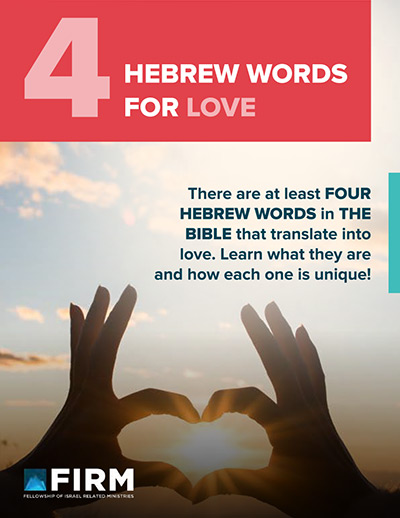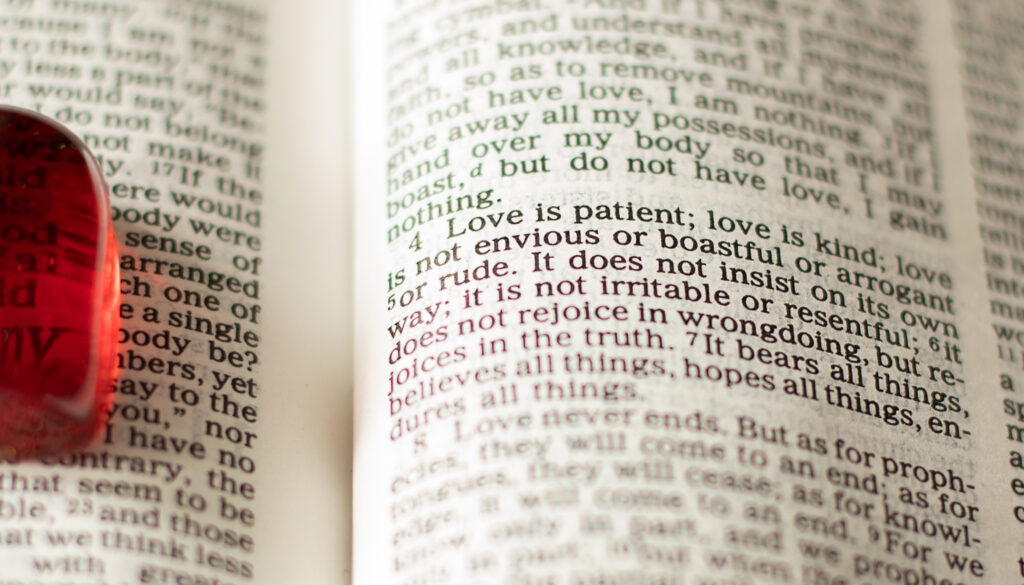Hebrew Word for Love
What is the Hebrew word for love? The English word love is powerful but also broad – so it’s not surprising that in Hebrew, there are multiple words for love. Wondering whether the word love in your Bible is used for more than one Hebrew equivalent? You are absolutely correct.
So, what Hebrew word for love is used most? What are the most commonly used in Scripture, and do they have different meanings? We are happy to help you find the answers you need.
Below you will find a list of four Hebrew words for love, plus a bonus section about a few Greek words! Because since we’re talking about the language of the Bible, let’s not forget that the New Testament was written in Greek.
The Hebrew Word for Love: Ahava / Ahab
If you asked an Israeli today, what is the Hebrew word for love, they would likely say ahava (noun) / le’ehov (verb). It is the word Hebrew speakers use most often today to say they love someone or something. Yes, it can express both a romantic kind of love, as well as your favorite drink.
In the Bible, ahava often points to an intense emotional bond, a strong connection. For example, it says that Jacob “loved Joseph more than all his children” (Gen. 37:3). And romantically as well, like in the case of Isaac who loved his wife Rebekah (Gen. 24:67) and Jacob – his wife Rachel (Gen. 29:18).
This Hebrew word also appears in important passages about love from Ecclesiastes and Song of Solomon. Solomon wrote that to everything there is a season:
A time to love, and a time to hate, a time of war, and a time of peace (Ecclesiastes 3:8)
But is ahava the kind of love that God gives as well? Yes! In fact, the prophet Hosea uses the Hebrew word ahava several times, most poignantly when urging Israel to return to the Lord, who promises:
“I will heal their backsliding, I will love them freely, for my angel has turned away from him.” (Hosea 14:4)
The Hebrew Meaning of Hesed
Throughout the Hebrew Bible, we see hesed translated in a number of different ways: steadfast love, mercy, lovingkindness, and goodness. While these synonyms develop our understanding, they only just skim the surface of this multifaceted, rich word.
Lovingkindness is an interesting word in the English language. Built out of two other words, it combines the definitions of both and then some. While “lovingkindness” can be considered somewhat archaic, many English Bible translations use it in Psalms.
“Let not the floodwater overflow me, nor let the deep swallow me up; and let not the pit shut its mouth on me. Hear me, O LORD, for Your lovingkindness is good; turn to me according to the multitude of Your tender mercies.” (Psalm 69:15-16 NKJV)
A Loyal Covenant
The Hebrew word hesed points to a loyal type of love, a covenantal love. At the same time, it is characterized by great tenderness and consideration towards others. Theologian John Oswalt described hesed as “… a completely undeserved kindness and generosity”.
Examples of hesed abound throughout the Scripture. It is one of the most fundamental characteristics of God, consistent with what we know about His covenantal nature.
Bible scholar Darrell L. Bock said that hesed is “wrapping up in itself all the positive attributes of God: love, covenant faithfulness, mercy, grace, kindness, loyalty–in short, acts of devotion and loving-kindness that go beyond the requirements of duty.”
A Hebrew Word for Love in Racham
Although the Hebrew word racham in the Bible most commonly is translated to compassion, there are a few significant instances where the English Bible uses the word love instead. In its expansive meaning, the word racham can stand for a caring, devoted type of love.
David uses the Hebrew word racham in Psalm 18, where He shows His devoutness to God:
I will love You, O Lord, my strength. The Lord is my rock and my fortress and my deliverer… (Psalm 18:1-2a)
Jewish scholars describe racham as a perfect, infinite love, like the one between a parent and a child. Maybe because it shares the root with the Hebrew word for womb – rechem.
God said through Hosea that He will show love or have mercy on Israel, He will call them His people and they will call Him their God (2:23). Where some translations use the word mercy and some use love, the Hebrew prophet used the word racham. It is the complete kind of love which, once given, is reciprocated – just like in the verse from Hosea.
Love Hidden in the Hebrew Word Dod
The Hebrew word dod is a little tricky. It can mean uncle, which is its most common use in Modern Hebrew. However, in the Bible, the word dod appears just as frequently in a romantic context, usually translated into “beloved”.
Most recognizably, you will come across this word in almost every chapter of the Song of Solomon. The author showers his lover with compliments, using the word dod to emphasize their relationship: “Behold, you are beautiful, my beloved, truly lovely.” (1:16)
Ani l’dodi v’dodi li
Then, the most popularized romantic use of the word dod comes from Song of Songs 2:16:
“My beloved is mine and I am his”
(Ani l’dodi, v’dodi li – אני לדודי ודודי לי)
Prophets Isaiah and Ezekiel also use the word dod to speak of love and show us just how profound its meaning is. In chapter 16, Ezekiel writes of God’s love for Jerusalem despite her unfaithfulness. Jerusalem was struggling, but verse 8 says:
“When I passed by you again and looked upon you, indeed your time was the time of love; so I spread My wing over you and covered your nakedness. Yes, I swore an oath to you and entered into a covenant with you, and you became Mine,” says the Lord God. (Ezekiel 16:8)
Bonus: Greek Words for Love
This list would not be complete, if we did not mention love from the New Testament perspective. Yes, the New Testament was not written in Hebrew but in Greek. So, to not lose ourselves in a whole new language, here is just a short explanation of the four Greek words for love (for further study, we recommend CS Lewis’ book, The Four Loves).
Eros is the romantic, passionate love; it describes the unity between husband and wife. Although this word does not appear in the New Testament, we’re including it here, because it is used in Greek translations of the Old Testament.
The phileo word for love is friendly, affectionate, and considerate. When Mary and Martha told Jesus that Lazarus fell ill, they said: “the one you love is sick”. (John 11:3) Lazarus and Jesus shared a deep, loving friendship, where a friend can be closer than a brother.
The love called storge in Greek is a familial love, the natural kind that points to a special bond. Although used sparingly in the New Testament, its meaning shines forth in Romans 12:10: “Be devoted to one another in love. Honor one another above yourselves.”
Finally, the word agape stands for the highest form of love. It is unconditional, self-sacrificial, patient, kind, and it never fails. Yes, agape is the word used in 1 Corinthians 13, the most famous Biblical chapter about love. Agape is the love God has for His Son Jesus (John 17:26), and the love He has for us (John 3:16).
Understanding the Hebrew Words for Love
But let’s come back to our list of Hebrew words for love because there is something truly special we should recognize about them. They all have something important in common.
At one point or another, every single one of these Hebrew words for love was used in the context of God’s great bond and commitment to His people Israel.
Ahava: “I have loved you [Israel] with an everlasting love …” (Jeremiah 31:3)
Hesed: “Though the mountains be shaken, and the hills be removed, yet my unfailing love for you [Zion] will not be shaken nor my covenant of peace be removed.” (Isaiah 54:10)
Racham: “…I will show my love to the one I called ‘Not my loved one.’ I will say to those called ‘Not my people,’ ‘You are my people’; and they will say, ‘You are my God.’” (Hosea 2:23)
Dod: “When I passed by you [Jerusalem] again and looked upon you, indeed your time was the time of love; so I spread My wing over you and covered your nakedness. Yes, I swore an oath to you and entered into a covenant with you, and you became Mine,” says the Lord God. (Ezekiel 16:8)
The conclusion here is simple: God loves Israel, and He wanted to say it with every word for love.
How Do You Love God?
Now that we know how to name and express love in multiple ways, we can ask ourselves: how do we love God? And how can we show Him that we love Him? One way is to love His people, Israel.

4 Hebrew Words for Love – Free PDF Download
What are the Hebrew words for love? Explore these 4 different Hebrew words and learn their distinct meanings.
Articles Related to What are Hebrew Words for Love? Here are Biblical and Modern Hebrew Answers
Estimated reading time: 7 minutes


